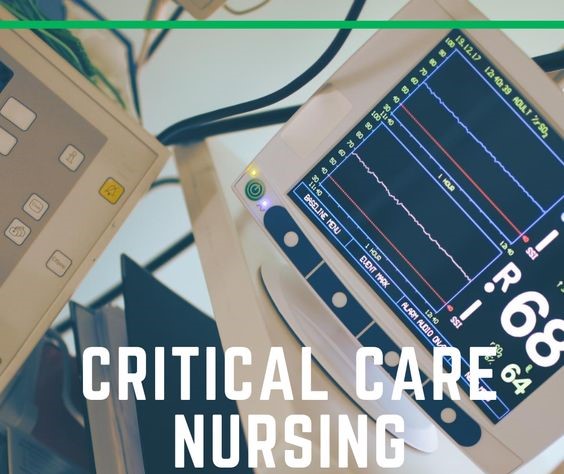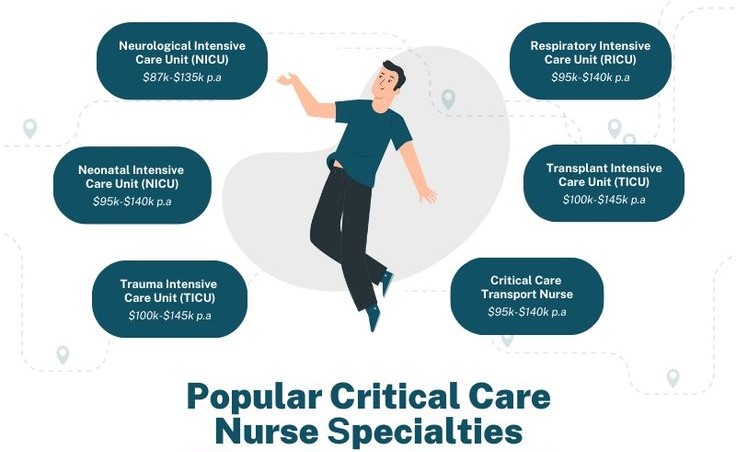
Table of Contents
The world of critical care nursing is a dynamic and demanding realm, where life hangs in the balance and every decision holds immense weight. To delve into this intricate tapestry of knowledge and practice, you may be required to write a critical care nursing essay. The essay is more than just a compilation of facts; it’s an opportunity to showcase your understanding, critical thinking, and ability to weave together complex concepts.
This article provides a comprehensive guide to writing a captivating and insightful critical care nursing essay. We’ll explore everything from defining critical care nursing, choosing a topic to polishing your final draft, offering practical tips and strategies to help you craft a winning essay that stands out.
Critical Care Nursing: A Life-Saving Specialty
Critical care nursing is a specialized area of nursing that focuses on providing high-level, complex care to critically ill or injured patients. These patients require close monitoring, frequent interventions, and advanced medical treatments.
Here’s a breakdown of what makes critical care nursing unique:
- Patient Population: Critical care nurses care for patients with life-threatening illnesses or injuries, such as heart attacks, strokes, trauma, sepsis, and respiratory failure.
- Setting: Critical care nurses work in intensive care units (ICUs), which are designed for patients requiring constant monitoring and support. Different types of ICUs exist, such as cardiac ICUs, surgical ICUs, and neuro ICUs.
- Advanced Skills and Knowledge: Critical care nurses possess specialized skills and knowledge in areas like:
- Hemodynamics: Understanding and monitoring blood pressure, heart rate, and other circulatory parameters.
- Ventilator Management: Caring for patients on mechanical ventilation, including adjusting settings and troubleshooting problems.
- Medication Administration: Safely administering a wide range of medications, including vasoactive drugs, antibiotics, and pain management medications.
- Monitoring and Interpretation: Continuously assessing patients’ vital signs, laboratory results, and other indicators of their condition.
- Communication: Effectively communicating with doctors, other nurses, and patients’ families.
- Ethical Decision-Making: Navigating complex ethical situations that arise in critical care.
- Teamwork: Critical care nurses work closely with physicians, respiratory therapists, pharmacists, and other healthcare professionals to provide comprehensive care.
- Emotional Support: Critical care nurses often provide emotional support to patients and their families during stressful and uncertain times.

Why is critical care nursing important?
- Improved Patient Outcomes: Critical care nurses play a vital role in improving patient survival and recovery rates.
- Reduced Complications: Their expertise helps prevent complications and ensure optimal patient care.
- Patient Safety: Critical care nurses are highly trained to respond to emergencies and ensure patient safety.
- Increased Quality of Life: They strive to provide the highest quality of care and support to patients and their families.
Becoming a Critical Care Nurse:
Becoming a critical care nurse typically requires:
- Registered Nurse (RN) licensure: This is the first step, requiring a nursing degree and passing the NCLEX-RN exam.
- Critical Care Nursing Certification: Obtaining a specialty certification, like the CCRN (Critical Care Registered Nurse), demonstrates advanced knowledge and skills.
- Experience: Many critical care positions require previous experience in other areas of nursing, such as medical-surgical or emergency nursing.
Critical care nursing is a challenging but rewarding career for those passionate about providing life-saving care and making a difference in the lives of patients and their families. Understanding the above elements is essential in crafting a compelling critical care nursing essay.
Tips for Crafting a Captivating Critical Care Nursing Essay
1. Choosing the Right Topic: A Foundation of Strength
The first step in writing a compelling critical care nursing essay is selecting an engaging topic. While the specific focus may be dictated by your assignment guidelines, there are several key considerations:
- Relevance: Opt for a topic that aligns with current trends and challenges in critical care nursing. This could involve emerging technologies, ethical dilemmas, or evolving patient care models.
- Personal Interest: Choose a topic that genuinely interests you, as your passion will shine through in your writing. If you’re passionate about a particular patient population, a specific technology, or a specific aspect of care, explore it in depth.
- Feasibility: Ensure that you have adequate access to credible resources, research data, and clinical experience to support your chosen topic.
- Specificity: A narrow focus allows for in-depth exploration and strengthens your argument. For instance, rather than “Challenges in Ventilator Management,” consider “The Impact of Early Mobilization on Ventilator-Associated Pneumonia in Critically Ill Patients.”
2. Researching Your Topic: Building a Solid Foundation
Once you’ve chosen your topic, thorough research is crucial for building a strong foundation for your critical care nursing essay. Embrace a multi-faceted approach to ensure comprehensive coverage:
- Scholarly Articles: Utilize databases like PubMed, CINAHL, Nursing Papers and Cochrane Library to access peer-reviewed research articles. Focus on recent publications and studies with robust methodologies.
- Nursing Textbooks: Consult leading textbooks on critical care nursing to provide a comprehensive overview of relevant concepts, principles, and practices.
- Professional Guidelines: Familiarize yourself with evidence-based guidelines from organizations like the American Association of Critical-Care Nurses (AACN) and the Society of Critical Care Medicine (SCCM).
- Clinical Experiences: Draw upon your own clinical experiences to provide real-world context and personal insights. However, ensure that patient confidentiality is maintained.
- Case Studies: Analyze relevant case studies to illustrate complex concepts and clinical scenarios. This can provide a vivid and relatable narrative for your essay.
3. Crafting a Compelling Argument: The Heart of Your Essay
The heart of any critical care nursing essay lies in its argument. A well-constructed argument is clear, concise, and supported by evidence. Follow these steps to craft a persuasive argument:
- Identify a Thesis Statement: This is your central claim, the core argument you will defend throughout your essay. It should be specific, debatable, and relevant to your topic.
- Develop Supporting Arguments: Provide a range of evidence from your research to support your thesis statement. This may include statistics, case studies, clinical research, and expert opinions.
- Use Logical Reasoning: Connect your supporting arguments to your thesis statement using logical connectors (e.g., therefore, because, consequently). Avoid fallacies and ensure a clear and logical flow.
- Consider Counterarguments: Acknowledge opposing viewpoints and provide counterarguments. This demonstrates critical thinking and a balanced perspective.
4. Structure and Organization: Creating a Coherent Narrative
The organization of your critical care nursing essay is crucial for clarity and reader engagement. Here’s a recommended structure that you should follow when crafting a critical care nursing essay.

- Introduction: Start with a captivating hook that grabs the reader’s attention. Briefly introduce your topic and state your thesis statement.
- Body Paragraphs: Each body paragraph should focus on a single supporting argument, offering specific evidence and analysis. Ensure clear topic sentences and smooth transitions between paragraphs.
- Conclusion: Summarize your main points and restate your thesis statement. Conclude with a powerful statement that leaves a lasting impression.
5. Writing Style: Clarity, Precision, and Impact
Your writing style plays a critical role in conveying your message effectively. Strive for:
- Clarity and Conciseness: Use precise language and avoid jargon. Sentences should be well-structured and easy to understand.
- Professional Tone: Maintain a formal and objective tone throughout your essay. Avoid using slang, colloquialisms, or overly personal anecdotes.
- Active Voice: Employ active voice whenever possible, as it makes your writing more concise and impactful. For example, “The nurse assessed the patient’s vital signs” is more effective than “The patient’s vital signs were assessed by the nurse.”
- APA Format: Adhere to the American Psychological Association (APA) format for citations, referencing, and overall structure.
6. Proofreading and Editing: Polishing Your Work
Once you’ve completed your critical care nursing essay, it’s essential to proofread and edit it meticulously. This step ensures clarity, accuracy, and professionalism:
- Read Aloud: Reading your essay aloud can help you identify grammatical errors, awkward phrasing, and unclear sentences.
- Check for Consistency: Ensure consistent formatting, citation style, and tone throughout your essay.
- Seek Feedback: Ask a trusted peer, friend, or mentor to review your essay for clarity and objectivity.
7. Enhancing Your Essay: Additional Tips for Excellence
To elevate your critical care nursing essay to the next level, consider these additional tips:
- Use Visual Aids: Incorporate tables, figures, or diagrams to enhance clarity and visual appeal.
- Include Personal Reflections: Share your own experiences and reflections on the topic to add depth and authenticity. Be mindful of maintaining patient confidentiality.
- Connect with Current Events: Link your essay to current trends, news events, or research findings relevant to critical care nursing.
- Explore Ethical Implications: Examine the ethical considerations associated with your chosen topic. This demonstrates your understanding of the moral and professional responsibilities of critical care nurses.
- Showcase Your Passion: Let your passion for critical care nursing shine through in your writing. Your enthusiasm will engage the reader and make your essay more compelling.

A Powerful Voice in Critical Care Nursing
Writing a strong critical care nursing essay is an opportunity to demonstrate your knowledge, critical thinking, and commitment to the profession. By following the tips outlined above, you can craft a captivating and insightful essay that will make a lasting impression. Remember, your essay is your voice, your opportunity to share your perspective and contribute to the ongoing dialogue within the field of critical care nursing.
This journey may seem daunting, but with dedication, a solid understanding of your topic, and a commitment to excellence, you can confidently navigate the labyrinth of writing and produce a compelling and impactful critical care nursing essay.
Get the Best Critical Care Nursing Essay Writing Help
Crafting a stellar critical care nursing essay is not always a walk in the park. However, you do not have to go it alone. At PhD Nurse Writer, we provide customized critical care nursing essay writing help, so you can focus on other core academic tasks. Our service covers topic suggestion, paper writing, proofreading and editing, plagiarism check and removal.





